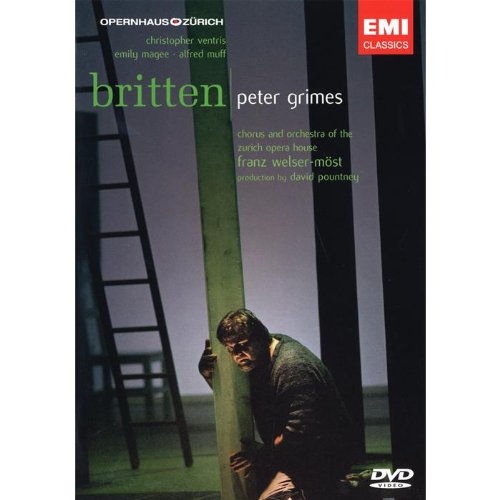Britten Peter Grimes
Superb new production throws a harsh light on Britten’s Borough
View record and artist detailsRecord and Artist Details
Composer or Director: Benjamin Britten
Genre:
DVD
Label: EMI Classics
Magazine Review Date: 3/2008
Media Format: Digital Versatile Disc
Media Runtime: 150
Mastering:
Stereo
DDD
Catalogue Number: 500 9719

Tracks:
| Composition | Artist Credit |
|---|---|
| Peter Grimes |
Benjamin Britten, Composer
Alfred Muff, Balstrode, Baritone Benjamin Britten, Composer Cheyne Davidson, Ned Keene, Baritone Christopher Ventris, Peter Grimes, Tenor Cornelia Kallisch, Mrs Sedley, Mezzo soprano Emily Magee, Ellen Orford, Soprano Franz Welser-Möst, Conductor Liliana Nikiteanu, Auntie, Contralto (Female alto) Liuba Chuchrova, Niece II, Soprano Martin Zysset, Rev Horace Adams, Tenor Richard Angas, Swallow, Bass Rudolf Schasching, Bob Boles, Tenor Sandra Trattnigg, Niece I, Soprano Valeriy Murga, Hobson, Bass Zurich Opera House Chorus Zurich Opera House Orchestra |
Author: Mike Ashman
The English director’s characters step out of years of “English” ambiguity into a light of glaring every-man (and woman)-for-himself selfishness. Balstrode listens to Grimes (Christopher Ventris, riveting) but only once (the capstan ensemble) does anything to help him; in the pub he gropes the women as much as Boles. Auntie, a red-headed Widow Begbick played with Oscar-winning charisma by Liliana Nikiteanu, and her Nieces are, quite openly, a Madame and her whores (with very visible drawers). Hobson, another terrifyingly intense portrayal, is a lazy, uncooperative psychopath, roused only by drink and the prospect of violence. Ellen is allowed more intimacy with Peter than one often sees (the beginning of the first Sea Interlude transition is used by the director to limn a relationship just on the verge of becoming physical) but, as soon as she realises his obsessive work methods will never change, her “Peter – we’ve failed” is final, provoking Grimes to inevitable self-destruction. In a penultimate Mad Scene of haunting, almost religious (or sacrilegious) beauty, she and Balstrode sit with a dead boy each draped across their laps, either side of the constantly see-sawing Peter on a stylised boat platform with a cross-like mast. Unforgettable.
Soon-to-depart Zürich maestro Welser-Möst’s reading of the score is hardly less innovative, reminding one with its forward, motoric winds of some great, lost Shostakovich score and, in the dance music so present in the pub scenes, of contemporaries Weill and Gershwin. For the final scene, the reprise of Sea Interlude 1 with markedly different texts, Welser-Möst matches the unrelenting cynicism of the Borough to the suicide of their unwanted, overachieving outsider with an extraordinary timbre at once larger and more hollow than its Act 1 counterpart.
No Grimes on film is without some distinctive merit but this new EMI issue is carried by its cast, phenomenal chorus contribution, director and conductor to an important new interpretative level.
Discover the world's largest classical music catalogue with Presto Music.

Gramophone Digital Club
- Digital Edition
- Digital Archive
- Reviews Database
- Full website access
From £8.75 / month
Subscribe
Gramophone Full Club
- Print Edition
- Digital Edition
- Digital Archive
- Reviews Database
- Full website access
From £11.00 / month
Subscribe
If you are a library, university or other organisation that would be interested in an institutional subscription to Gramophone please click here for further information.




